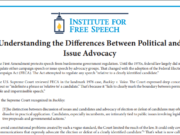The index is divided into three broad categories: disclosure, policy and oversight. In 2011, the disclosure component made up one third of a company’s overall score. This year more than half of each company’s score was determined by various disclosure factors. Changing the methodology from year to year, the index creates the illusion that companies have not established satisfactory disclosure practices. From 2011-12, there were significant changes to the relative weight assigned to disclosure of contributions to trade associations, 501(c)(4)s, candidates, political parties and 527 groups that don’t expressly advocate for the election or defeat of a candidate or party.
Companies that buy into the ostensible legitimacy of the index and try to change their practices to appease the activists often are dismayed to find that reforms made one year invite further demands the next year. For example, Merck was ranked first in the index in 2012 but received two separate shareholder proposals demanding additional disclosure in 2013. A high ranking on the index is no insulation from further demands.
The presumption that more disclosure by corporations is necessarily good for investors is also deeply flawed. U.S. companies must compete in a highly politicized world in which engagement in politics—and with politicians—is, unfortunately, necessary. In the context of antitrust, intellectual property, securities regulation, environmental law and many other fields, engagement in politics often is essential for survival. Boards of directors’ fiduciary duties to maximize shareholder value often require that companies engage with the politicians who control the competitive and regulatory environment in which they operate.
Lobbying and political contributions by companies are necessary. James Madison’s observation in Federalist 10 that “enlightened statesmen will not always be at the helm” today seems highly optimistic: We live in a time when enlightened statesmen are seldom at the helm. Instead, many politicians often seem intent on stifling free enterprise with crippling regulation. Regulations like those in the 2010 Dodd-Frank financial reform law are tough enough to overcome. It was essential for businesses to get the word out regarding policies such as carbon cap-and-trade and union card-check legislation before they could do even more economic damage.
If shareholder activists brandishing the CPA-Zicklin Index stop capitalists in the U.S. from engaging in politics, only anti-capitalists will have a voice inside the Washington Beltway. The results would be catastrophic for American competitiveness.













